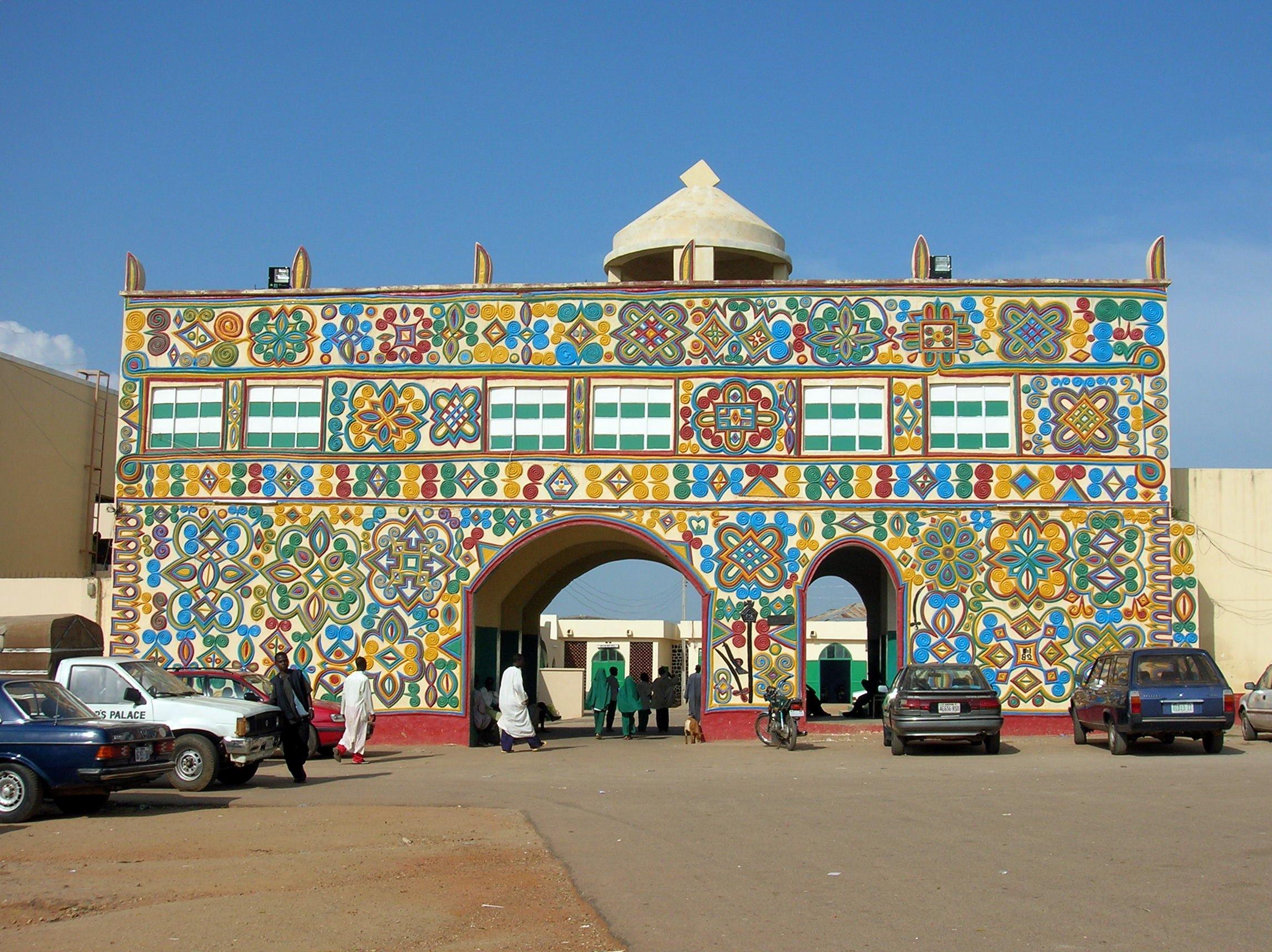
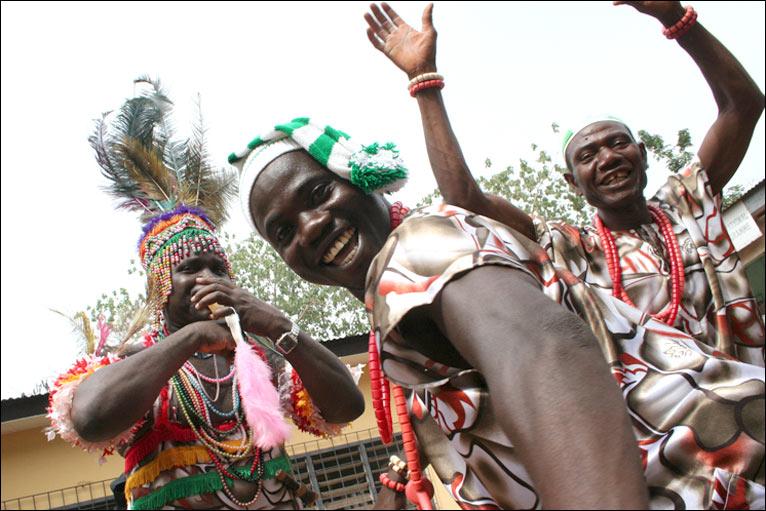
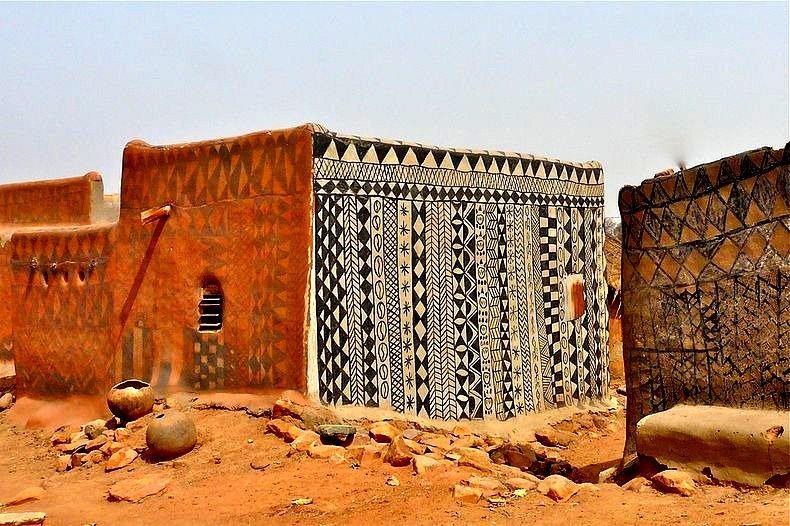
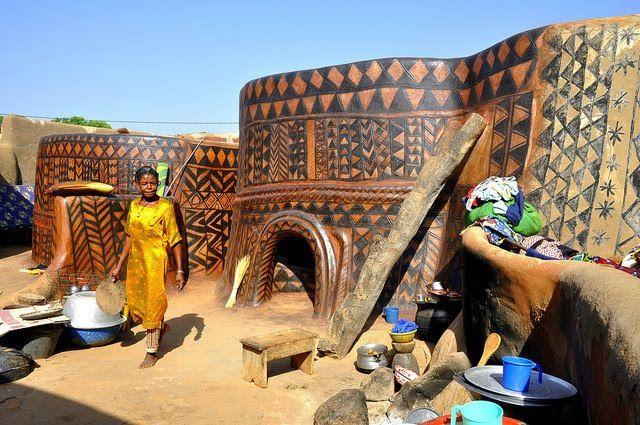
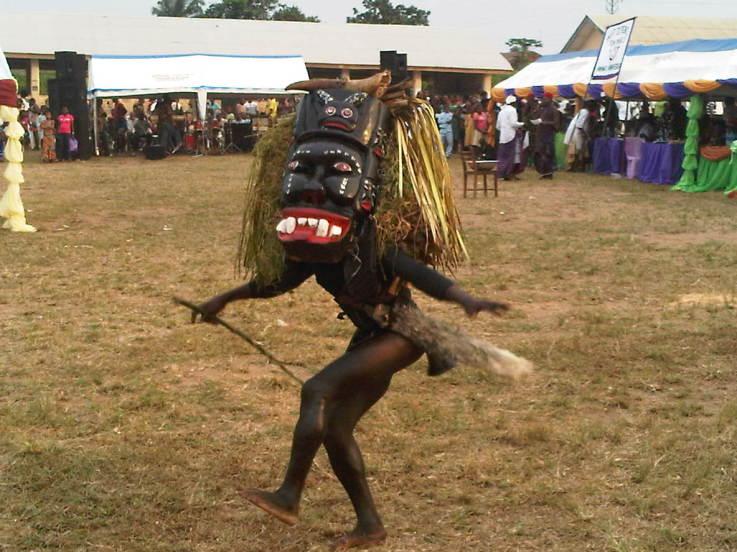
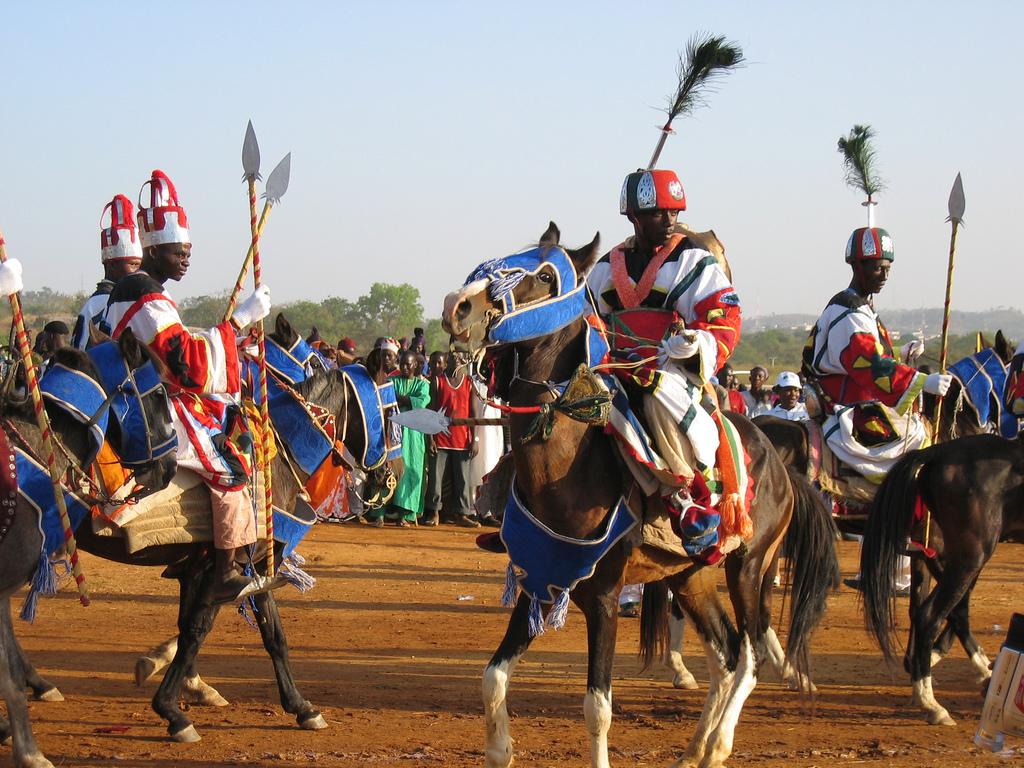
The thirteen provinces of Northern Nigeria make up an enormous tapestry of different races – Hausas, Yorubas and Fulanis among them. Modern cities like the capital, Kaduna, exist side by side with villages linked only by tracks through the bush, and traditional crafts live on with the latest industries.
Houses in the Muslim walled city of Kano, the capital of Kano Province which has a population of nearly 6 million. Kano is an Emirate, and was a powerful organized state when the British first arrived in the country in the 1880s. A link with the old days is provided by the Emir’s trumpeter, who blows a fanfare when aircraft arrive at Kano’s international airport. In former times the trumpeter used to announce the arrival of camel trains from the north. The main crop of the province is groundnuts, stored in giant pyramids of sacks. Other staple crops are millet, cotton and cassava; hides and skins are also an important source of income.
Kano produces its own characteristically dyed cloth, in traditional patterns. The dying pits, fifteen feet deep, are cut into solid rock. The unbleached cotton top left is dyed in pure vegetable indigo, mixed with cold water. White stripes left are produced by tacking down folds in the material so that the dye does not penetrate. More complex decoration above is produced by the same technique as the Javanese batik: the pattern is marked out in wax, so that the dye runs off, leaving an intricate design in white.
Funtua is a centre for the manufacture of the water-pots that the women of Northern Nigeria carry so gracefully on their heads. Donkeys bring the clay from pits some miles away. The pictures below show the way in which the pots are made. A pancake of clay is kneaded to the right size, and is shaped over a mould of mushroom form. The sun dries it to a leathery consistency, and it is then fired in kiln huts at a low temperature, becoming a rich brick-red. The completed post left cost only a few shillings. The porosity of the clay allows transpiration, and keeps the water cool.
Are you interested to know more about the Northern face of Nigeria?
Let us hear from you at +91 33 4046 4646
Itineraries
Lagos and Yorubaland
The Nigerian character can be enjoyed in all the main cities, and Lagos is without doubt west Africa’s wildest and most vibrant metropolis; despite the chaos it is the place where you can experience a few Western comforts. If Lagos becomes too overwhelming then leave the city and visit the other Yoruba towns in the cluttered southwest of the country. Abeokuta is famous for its sacred Olumo Rock, while Ife, as the centre of the Yoruba culture, has palaces and a museum, and Oshogbo has its eerie collection of weirdly shaped shrines in the sacred forest, a UNESCO World Heritage Site.
If you are interested in Yoruba culture then the better museums in this region are the National Museum in Lagos and the Ibadan Museum. Further to the east is Benin City, once the capital of a powerful and wealthy kingdom, where you can see examples of the traditional art of bronze wax casting in the museum and in the workshops along Igun Street.
Calabar and the Cross River
The colonial town of Calabar is easily one of Nigeria’s most relaxed and even relatively clean cities, with an excellent museum and a couple of conservation projects for Nigeria’s endangered wildlife that are well worth a visit. To the north of Calabar are the dense tropical rainforests of Cross River State, some of which have been cordoned off into the Cross River National Park. There are no visitor facilities, but it is possible to appreciate the forests at the Afi Mountain Drill Ranch, a sanctuary for the endangered drill monkeys and chimpanzees, or the Rhoko Forest, another primate sanctuary. Then there are the serene, cool and tranquil hills of the Obudu Plateau with its former cattle ranch, cable car and hiking trails.
Central region
Central Nigeria has a higher terrain of grassy plains dotted with outcrops of giant rocks. To the east of Abuja is the pleasantly located city of Jos on a high plateau with nice countryside, which has an interesting line of museums. To the east of Jos is Nigeria’s best-known national park, Yankari National Park, which still contains some wildlife, including a fairly healthy population of elephant. Here are the Wikki Warm Springs, a stunning swathe of mildly warm crystal-clear water in a forested valley.
Ancient cities of the north
The north of the country is dominated by the Hausa-Fulani walled cities which, for over a thousand years, have been powerful centres founded on trade and Islam. In these you will meet the more interesting of Nigeria’s peoples, for whom traditional dress, language and deeply devout religion are an important part of everyday life. Some of the mosques here fill with thousands of worshippers for Friday prayers, and the durbar festivals at the end of Ramadan are among the most colourful and spectacular events in west Africa.
In Kano are the famous dye pits, which produce some of the traditional cloths of Nigeria, and the ancient and claustrophobic Kurmi Market, where for centuries trans-Sahara camel caravans exchanged a wealth of goods with the Hausa traders. In Zaria is a fine example of an emir’s palace. To the extreme northeast are the shrinking watery channels of Lake Chad, once one of Africa’s super-lakes that has now largely disappeared, but if you make it this far you will be rewarded with the sight of the ancient Kanuri people, who still trade with people in Chad by canoe, and who could plausibly be one of the least-visited peoples of the world. There are places in more remote spots of the extreme east of Nigeria along the border with Cameroon that few people have ever seen and, although these are not impossible to reach by public transport, they are best visited in your own self-sufficient 4x4 vehicle. These include some of the national parks such as the Gashaka-Gumpti National Park. The UNESCO World Heritage Site at Sukur is slightly more accessible.
For assisted tour booking and customization according to your requirement, please call: +91 33 4046 4646
Price on request
As suggested and to be customized as per request

Terms & Conditions Applied
For assisted tour booking and customization according to your requirement, please call: +91 33 4046 4646
 Loading..
Loading..